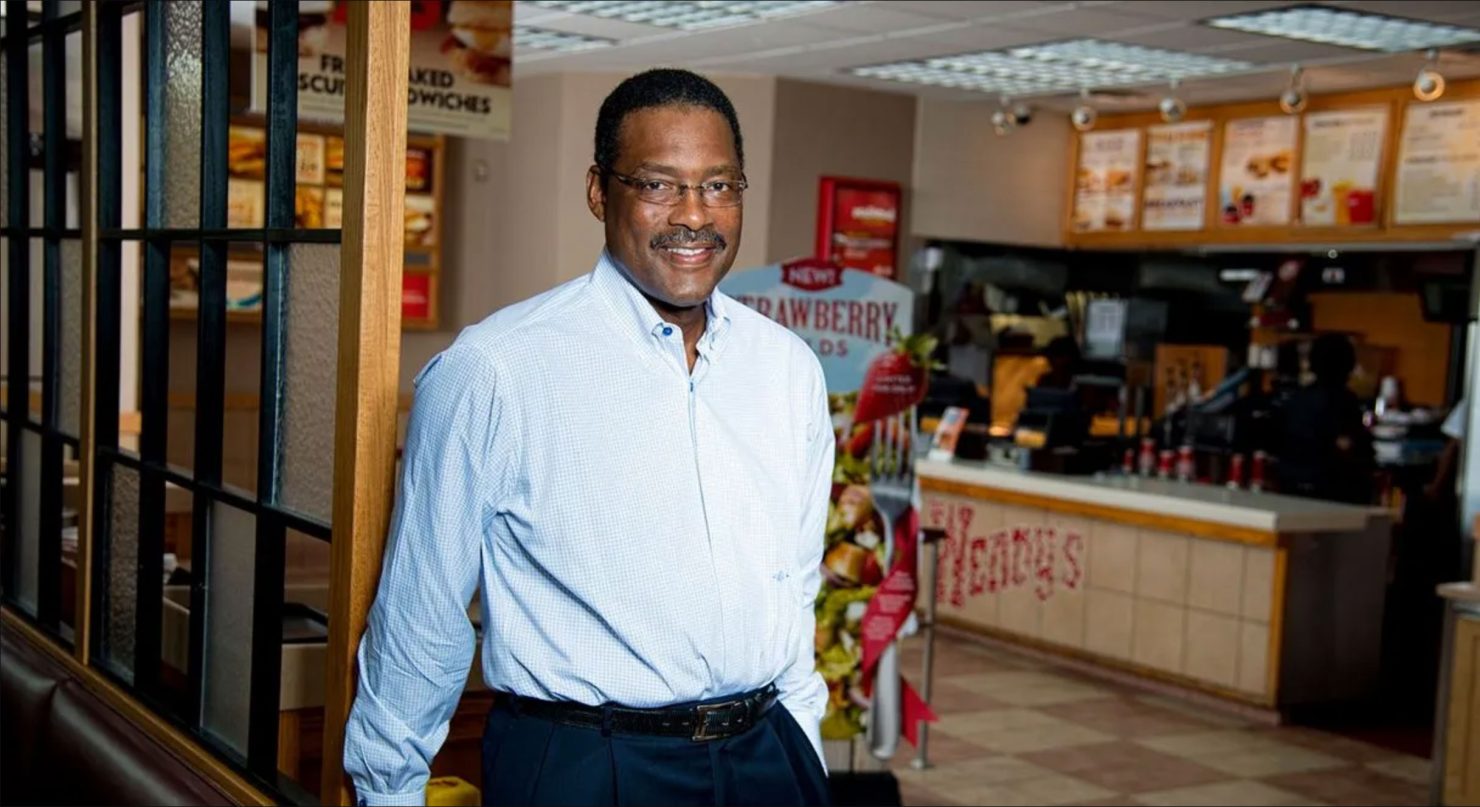Franchises of the rich and famous

Most of us have heard about “Cheeseburgers in Paradise,” but what about Donuts in the Sunshine State? As it turns out, legendary singer-songwriter Jimmy Buffett knows quite a bit about both. The country and folk legend is best known for his ballads about simple pleasures and hard times. What many don’t know, however, is that a considerable portion of Buffett’s net worth is generated by interests outside of song royalties and tour proceeds.
For nearly 40 years, Jimmy Buffett has been developing his own franchised brand and investing in others. His first venture, Margaritaville™, is a chain of concept restaurants, gift shops, hotels, and casinos themed on his famous musical aesthetic. A portion of the restaurants are franchised locations. Buffett is also co-invested in a group of Krispy Kreme locations across Florida. These ventures have made him one of the wealthiest musicians in history, with a reported net worth of more than $600 million.
And Buffett isn’t the only celebrity diversifying into franchise ownership.
From music industry moguls such as Rick Ross to professional athletes like Shaquille O’Neal and Venus Williams, scores of celebrities and other high-net-worth individuals use the franchise model to create alternate streams of income and diversify their holdings.
What makes the franchise model so attractive to celebrities who have already attained fame and fortune? And why do franchises in particular make great diversification tools?
We’ll explore these and other questions in today’s blog post. You can also check out our latest YouTube video where we further discuss how the rich and famous have been leveraging franchises to skyrocket their wealth.
Why do Celebs Love Franchise Ownership?
Fame fades and sports careers come to an end, but smart investing can pay dividends forever. Celebrities and the ultra-wealthy recognize this, so creating a solid system of passive wealth accumulation is a top priority for many.
While investment can be exciting and creative, it’s also the best way to future-proof the lifestyle you’ve built over years in the spotlight. The caveat is, you need to invest in the right business opportunities. For every celebrity and sports star who rakes in millions during their career, there is a high percentage whose wealth doesn’t outlive their fame. More than 75 percent of NFL players are insolvent within two years of retirement, and 60 percent of NBA players are broke within five years according to reporting by Sports Illustrated. Much of this financial duress could be avoided through thoughtful investment into sound and stable businesses.
For decades, franchise ownership has played a key role in safe, reliable wealth creation for one-percenters. It remains a preferred income model for the wealthy due to its relative stability and track record of success. For celebrities, franchise ownership can enable them to capitalize on their star power — or to quietly accumulate wealth away from the limelight.
Shaquille O’Neal is one such stealth empire-builder. The former NBA superstar is reported to have invested in hundreds of franchise opportunities, from car washes and fitness centers to restaurant chains and Vegas nightclubs. His estimated $127m franchise empire far exceeds the contract money he earned during his time on the court.
With the average professional sports career lasting a brief three to six years, building a strong investment strategy is imperative for capitalizing on your time on the court or on the field. And Shaq isn’t even the highest-paid former player.
Actually, if we asked you “Who are the top three richest NBA players?” at trivia night, most people would be hard-pressed to name all three.
With a household name (and number), the legendary #23, Michael Jordan, takes the top spot. Second place is a tie between another famous name — Magic Johnson — and a name you probably won’t find on much sports memorabilia.
That player is fellow NBA alum Ulysses Lee “Junior” Bridgeman.
If you’re wondering, “Who’s that?” and how he ended up in the top three, you’re not alone. Bridgeman, a former Milwaukee Bucks shooting guard, left professional sports in 1987 after 12 years on the court. Though lacking the household name status of his fellow well-paid players, Bridgeman has parlayed his comparatively modest annual salary of $350,000 into a massive $600m net worth. Much of his earnings can be attributed to successfully leveraging the power of the franchise model.

In some cases, celebrities have a more personal connection to the franchise journey. Buffett’s Margaritaville brand, selling the vibe of leisurely, down-to-earth fun at restaurant and resort locations, gives Buffett’s Parrothead fan base another way to connect to the overall Buffett brand and ethos.
In another example, Actor Mark Wahlberg — in partnership with brothers Paul and Donnie — opened their Wahlburger™ franchise of restaurants as an homage to family and the boys’ working-class upbringing in the suburbs of Boston. While the restaurant features quirks such as genuine “government cheese” topping its burgers, the 49-location franchise has netted the Wahlburg family hundreds of millions of dollars. The business even inspired a reality TV show running ten seasons.
What Makes Franchises Attractive to Investors
Celebrity or no, there are a few reasons investors prefer the franchise model to other traditional forms of wealth building.
Portfolio Diversification
If you want to build stable investment income, you need well-diversified holdings. Relying heavily on one investment class (such as putting all your money in the stock market) can result in radical swings from one year to the next. Wealth managers suggest that high-net-worth individuals diversify into a variety of asset classes — and franchise investment is one of the most popular.
Franchise investing offers an opportunity for investors to earn steady returns, and because they operate outside of mainstream market influence, franchises are an ideal way to help insulate your portfolio against inevitable swings in the economy and stock market.
Inflation Hedging
Inflation is a culprit that quietly eats wealth. While traditional investing can provide stable returns — the stock market has delivered a reliable 10 percent return over the last 100 years — the rising cost of goods and services over time will erode the purchasing power of your money.
Investing in franchises, which are focused on goods and services, allows your investment to better keep pace with inflation over the long term. When economic impacts make prices go up, your prices can rise with them. Not only is franchising potentially recession-resistant, but returns may increase as prices climb.
Predictable Returns
The strength of the franchise model is in the ability to replicate results. Unlike single-location businesses, franchises are highly systematized and closely audited financial vehicles. Franchise plans are built on data and metrics from other already-successful locations. They can offer a similar IRR as other assets like venture capital investing, while providing transparency and a proven road map to profitability.
Why Don’t More Average People Run Franchises?
The franchise model is powerful because it offers the potential for a reliable, largely passive income stream. If this is the case, why don’t more everyday people invest in franchises? As it turns out, celebs and the ultra-wealthy have a few advantages that most of us don’t. For the ordinary investor, franchise ownership presents a few obstacles, such as …
Start-up Costs
Celebrities and the ultra-wealthy have start-up capital to spare, so investing in a franchise (or even hundreds of them) is a straightforward investment choice. But the high cost of starting a franchise has kept it out of reach for most ordinary investors. Fees and costs for a single franchise location start at around $100,000 and can climb to more than $1 million, depending on the brand, location, and territory.
Time
Most celebrity and high-net-worth franchise owners are not hands-on participants in their locations; rather, they have management teams that conduct daily operations. For the ordinary franchise owner, you can expect to invest considerable time in your new enterprise. Many would-be entrepreneurs simply don’t have the time to invest, or prefer a passive income model that allows them the freedom to pursue other interests.
Management Expertise
Traditional franchise ownership is not a plug-and-play investment; most successful franchise owners have at least some previous experience in the model. In some cases, they may be former franchise management staff, or have some level of business experience that involves brick-and-mortar management. Whereas a celebrity or a high-net-worth investor can hire management teams to effectively run multiple locations, the average franchise owner needs specialized knowledge to be successful.
The Best Way to Passively Invest in Franchising
If you don’t have access to celebrity-level funds or don’t have the time and expertise to jump into franchise ownership, you can still take advantage of this important tool.
Through fractional ownership of franchises, you have the opportunity to benefit from low volatility, predictable returns, and healthy diversification without the same large upfront costs or challenges. With as little as $500, you can start investing in one of the favored wealth-building tools of celebrities and ultra-wealthy individuals.
While all investments have some level of risk, investing in fractional franchises provides investors with the opportunity to reap the benefits of franchising with a completely passive model. There is no learning curve to maneuver, no management skills to build, and no time investment running a franchise location since you’re working with our professional franchise investment and management teams. This model allows everyday investors to put an important asset class to work in their portfolio.
Want to learn more? Check out our TNT Franchise Fund offerings page to learn more and watch our offerings deep dive video.


